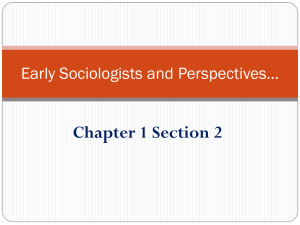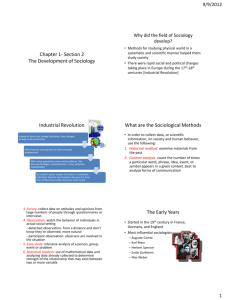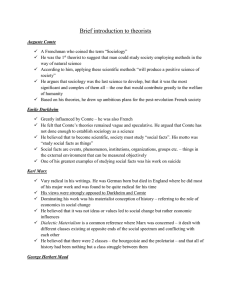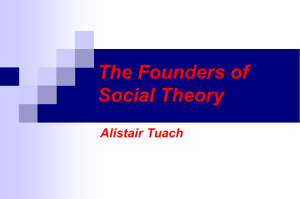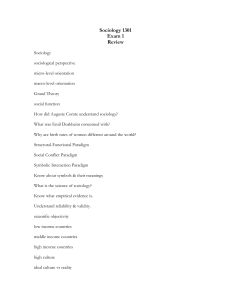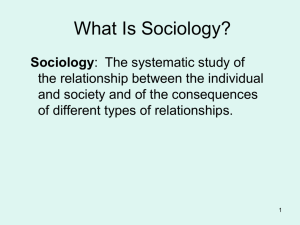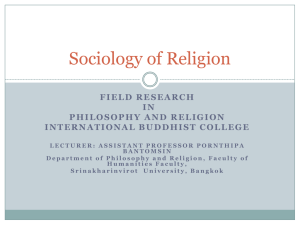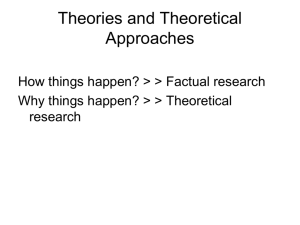Handout 1 - famuonline
advertisement
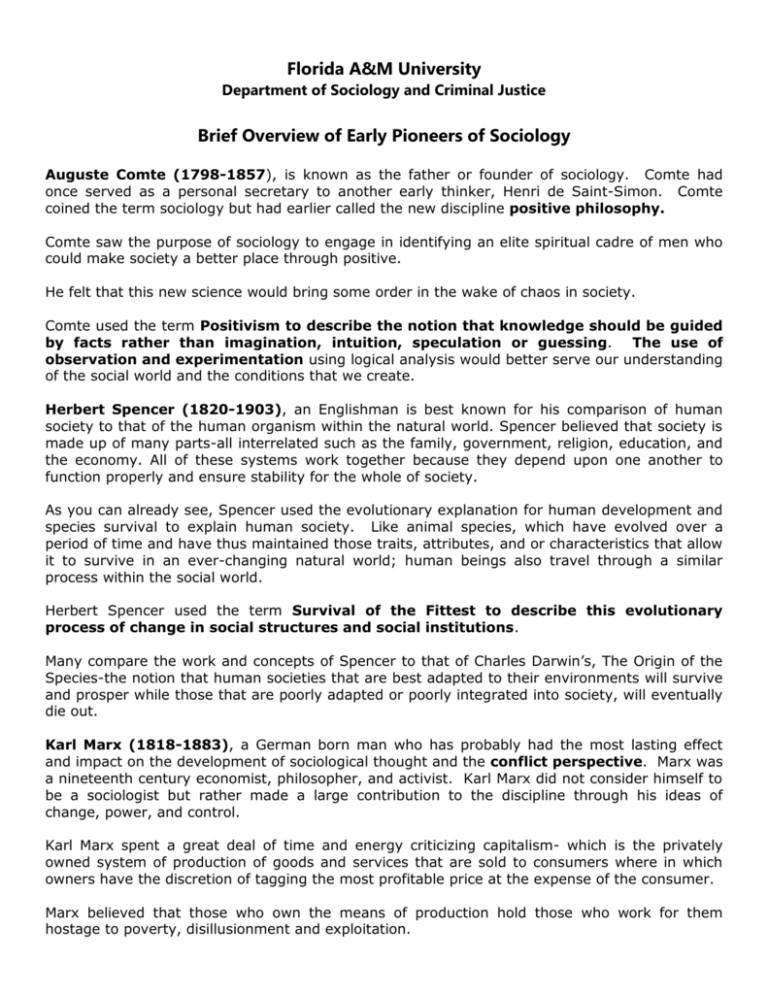
Florida A&M University Department of Sociology and Criminal Justice Brief Overview of Early Pioneers of Sociology Auguste Comte (1798-1857), is known as the father or founder of sociology. Comte had once served as a personal secretary to another early thinker, Henri de Saint-Simon. Comte coined the term sociology but had earlier called the new discipline positive philosophy. Comte saw the purpose of sociology to engage in identifying an elite spiritual cadre of men who could make society a better place through positive. He felt that this new science would bring some order in the wake of chaos in society. Comte used the term Positivism to describe the notion that knowledge should be guided by facts rather than imagination, intuition, speculation or guessing. The use of observation and experimentation using logical analysis would better serve our understanding of the social world and the conditions that we create. Herbert Spencer (1820-1903), an Englishman is best known for his comparison of human society to that of the human organism within the natural world. Spencer believed that society is made up of many parts-all interrelated such as the family, government, religion, education, and the economy. All of these systems work together because they depend upon one another to function properly and ensure stability for the whole of society. As you can already see, Spencer used the evolutionary explanation for human development and species survival to explain human society. Like animal species, which have evolved over a period of time and have thus maintained those traits, attributes, and or characteristics that allow it to survive in an ever-changing natural world; human beings also travel through a similar process within the social world. Herbert Spencer used the term Survival of the Fittest to describe this evolutionary process of change in social structures and social institutions. Many compare the work and concepts of Spencer to that of Charles Darwin’s, The Origin of the Species-the notion that human societies that are best adapted to their environments will survive and prosper while those that are poorly adapted or poorly integrated into society, will eventually die out. Karl Marx (1818-1883), a German born man who has probably had the most lasting effect and impact on the development of sociological thought and the conflict perspective. Marx was a nineteenth century economist, philosopher, and activist. Karl Marx did not consider himself to be a sociologist but rather made a large contribution to the discipline through his ideas of change, power, and control. Karl Marx spent a great deal of time and energy criticizing capitalism- which is the privately owned system of production of goods and services that are sold to consumers where in which owners have the discretion of tagging the most profitable price at the expense of the consumer. Marx believed that those who own the means of production hold those who work for them hostage to poverty, disillusionment and exploitation. Marx distinguished these two groups as the Bourgeoisie (capitalist) -those who own the means of production such as factories, stores, goods, and services in a given society and are able to produce more and more wealth, as they are able to control the lives and minds of the people and the economic system in that given society. The Proletariat (worker)-those who labor and whose labor produces the products of capitalism. The Proletariat also adds to the wealth of the Bourgeoisie through harsh working conditions, low pay and the continued exploitation of their families, health, life chances and opportunities. Marx asserts that these two groups have opposing interests and unequal power and control over their lives, thus they are in conflict with one another. Marx, further asserts that when the Proletariat realizes or reaches a sense of classconsciousness will they avail to overthrow the Bourgeoisies and create a classless society. Finally, Marx’s disdain for capitalism and interest in communism grew from the idea of a class society where people share unequal portions and access to scarce goods, services and opportunities to a classless system of society where the means of production are collectively owned and wealth, power and access to scarce resources are evenly distributed. Emile Durkheim (1858-1917), is said to have made sociology a real academic discipline. Durkheim believed that society is more that just a system made up of many parts but that society has a unique character solidly by itself. His views are said to have led to the development of the functionalist perspective. While many may choose to try to investigate the individual or micro-level aspect of human behavior, Durkheim felt that events of the social world extend beyond that of individual action. Further, society does not depend on any particular individual to function and operate Durkheim believed that when people share a common ideal or a common sense of morality, they are then bound to each other in expected behaviors, kinship ties, and traditions. Two concepts that were developed by Durkheim were Mechanical and Organic Solidarity. Mechanical Solidarity is a society that is held together or unified based on a shared consensus of values, norms, strong social pressures for conformity, strong kinship ties and a dependence on family and traditions. Organic Solidarity is a society that is held together or unified based on the fact that their member perform very specialized economic roles and are dependent upon one another. Finally. he is known for his empirical research study on Suicide. Max Weber (1864-1920), German trained university professor in law and economics. Weber focused most of his research on studying the relationship between Capitalism and Protestantism, power, bureaucracy and world religions. Weber was also interested in trying to discover the real or personal meaning behind human behavior. By understanding subjective intentions or reasons for human behavior, one could better understand the context of the behavior, the development of the behavior and thus be able to understand the person’s act or acts. Weber used the term verstehen, which is the method of understanding another by being empathetic. One must be able to put one’s self in the mind of the other if they are to truly understand the behavior of the person. William Edward Burghardt DuBois (1868-1963), a native of Massachusetts, DuBois enrolled in Fisk University in Nashville, Tennessee, and then at Harvard University, becoming the first black to earn a doctorate from the University in 1895. DuBois was a sociologist and a social activist who believed that the races had to work together to overcome the marked divisions and prejudices that were the foundation of social and racial tension in the United States. DuBois naturally studied the black community. Yet, most of his work and contributions to the discipline of sociology went unrecognized and ignored for many years. His further postgraduate work took him to Berlin at the University of Berlin under the direction of Max Weber and other prominent German social scientist. DuBois’s work includes The Philadelphia Negro (1899), which was the first scientific study of African-American life and the first impressive sociological study of an African-American community in the United States. DuBois was very concerned about many social ills of that time but he was really concerned about the problem of racism in the United States. He felt that with careful research and the use of the empirical basis for research that the results might be beneficial in achieving some racial equality. He felt like many today that racial prejudice is caused by ignorance and that sociology could provide knowledge needed to remove the unfairness and sickness caused by racism and injustice.

